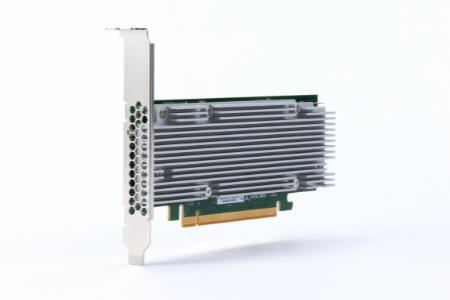ADLINK Launches PCIe-ACC100 to Accelerate 5G Virtualized Radio Access Network (vRAN) Applications
ADLINK Technology Inc. announced its 5G, forward error correction (FEC) accelerator adapter, the PCIe-ACC100. Based on the Intel® vRAN Dedicated Accelerator ACC100, the PCIe-ACC100 is suitable for both 4G and 5G network applications that emphasize high throughput and low latency. Supporting both 4G Turbo encoding and 5G low-density parity-check (LDPC), the PCIe-ACC100 does not require PCIe card auxiliary power and supports -5°C to +55°C operating temperature, which is in line with NEBS (Network Equipment-Building System) specifications.
In 5G applications, the most compute-intensive workload is FEC processing on the physical layer (L1) of the RAN architecture. Its main function is to correct information errors caused by noise or interference during the transmission of communication signals, help improve network performance and reduce network costs. FEC is also a general function and can be implemented across different software vRAN vendors. In addition, FEC accelerated processing does not include cell state information, allowing it to be easily virtualized, providing the benefits of resource sharing and simplifying base station migration.
ADLINK’s PCIe-ACC100 is a PCIe interface accelerator adapter developed based on Intel’s vRAN Dedicated Accelerator ACC100 eASIC chip. It supports 4G and 5G codec acceleration, checksum rate matching, onboard 4G ECC memory, and hybrid automatic repeat request technology (HARQ). The PCIe form factor HHHL (half-height, half-length) can meet the needs of most application scenarios.
“In contrast to traditional FPGA accelerator solutions, the PCIe-ACC100 uses the Intel® vRAN Dedicated Accelerator ACC100, enabling 4G and 5G encoding and decoding high throughput. Power consumption and cost are greatly reduced, helping to reduce customer CAPEX and OPEX. The PCIe-ACC100 also supports Intel’s FlexRAN™ reference architecture and is fully compatible with the FlexRAN reference software API interface of Intel FPGAs, providing convenience for development and software migration. It is also compatible with ADLINK’s full range of MECS platforms and servers with x86 architecture.” says Julian Ye, Director of Networking and Communications Group, ADLINK.

